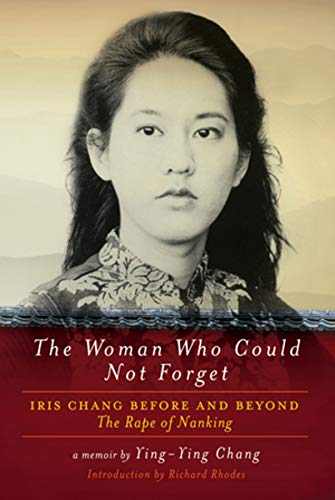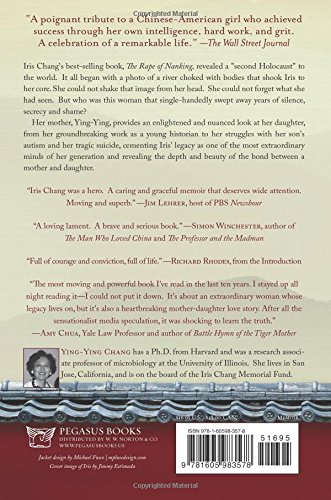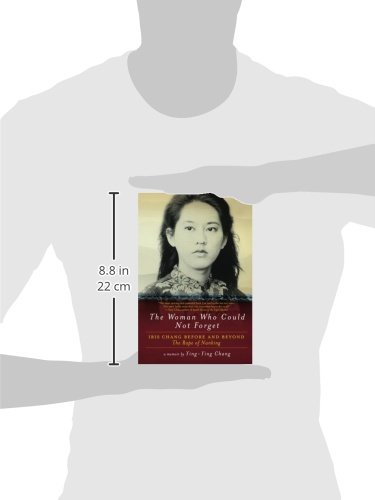Customer Services
Copyright © 2025 Desertcart Holdings Limited




Full description not available
J**K
A Loving Mother Writes of A Heroic Daughter
Amazon-The Woman Who Could Not Forget: Iris Chang Before and Beyond “The Rape of Nanjing”by Ying-Ying Chang, © 2011, Hardcover, 427 pages; Pegasus Books.The first chapter relates the almost unimaginable day that Iris Chang, young and beautiful author and speaker, committed suicide in November of 2004. This is her mother’s memoir of Iris’s life, published seven years later.This suicide lingers in a reader’s mind although the next eight chapters are a family album-type reminiscence that, while not being maudlin, would be pedestrian. Iris grew up with an intense intellectualism, starting from Iris’s birth (Chapter 2) through her childhood into high school and college. Even though she is an American born Chinese, and her parents do not impose the expectations on her that occur in Asia, her drive reflects both cultures and adds an intensity not found in most youngsters. With Chapter 9, Iris begins her early writing career although this skill had been a passion from her earliest schooling. “The “Thread of the Silkworm” became her first book.This memoir moves from letters to e-mails as the means of record keeping. It is Chapter 10 that puts Iris on track with an ambition, indeed an obsession, to chronicle the events of the Japanese invasion of Nanjing in 1937.Iris wrote: “In a single blinding moment, I recognized the fragility of not just life, but the human experience itself....” When she saw an exhibit of pictures from the Nanjing massacre, she states “The horror of those photographs inspired me to write the book.”Unfortunately, there are those who deride Iris’s work as nothing more than hate-mongering and the repetition and distortion of common records. Her mother’s book opens up the extensive research Iris did, including the first examination of archival letters and the use of FOI requests to secure government documents that had been sealed for half a century. Iris was bi-lingual and traveled to China to interview survivors. Once the book is published and becomes a best-seller, Iris is already speaking coast-to-coast both in book tours and on behalf of the various Chinese American organizations.Photos in the center of the book provide a panorama of Iris’s life, from baby pics to family vacations to the photos that propelled Iris to write the Rape of Nanking.Here is also the behind-the-scenes perspective on the discovery of John Rabe’s diary, discussed heavily in the Rape of Nanking book.Iris’s growth as a writer came from her profuse reading. Her growth as a speaker also came from her extensive reading of great speeches from Clarence Darrow to Winston Churchill. “I feel engaged in actual conversation with them. Word s are the only way to preserve the essence of the soul.”By Chapter 14, Iris is a celebrity which leads to a ‘roller coaster” life in Chapter 15. When her father, a famous physicist in his own right, visits the head of Taiwan’s National Science Council, “...he jokingly said “I’d prefer to see your daughter rather than you!”Iris’ third (and last) book was on the Chinese in America. Again the reader can understand the tremendous work that goes into the research behind writing an authoritative book. I have fully understood the American stupidity and outright racism behind the Wen-ho Lee episode, but her angry pointing out of the absolute racial profiling in the government’s Cox report added substance. “Their story reminds me of the kind of irresponsible journalism that marred the Tsien case during the McCarthy era.”Iris felt history deeply: “People die twice—once as mortals, and once in memory. I weep when stories are lost.” and “The spoken word vanished with the wind. Likewise the unrecorded life disappears as if it never existed.”Nor could she tolerate the weakness of human society: “People tend to move, subconsciously, in the direction of other people’s expectations.”Because Iris and her husband were immunologically incompatible, it made pregnancy impossible Several chapters describe IVF and the surrogacy of their baby. Iris contemplated a book on how reproduction techniques could eventually give women an equal footing with men.Iris also aided in politics in getting the full disclosure act passed that allowed the declassification of military records over Japanese wartime atrocities. Iris went on the reveal how the US had not only ignored Article 26 on Japanese reparations to victims, but assisted Japan in waiving US veterans’ claims to reparations.Finally, at Chapter 19, the clouds roll in and the “high” ends as various events eventually lead to depression. Much attention in Chapter 20 is focused on treatments for depression and the possibility that side effects of these psychotic drugs were the cause of Iris’ suicide. While outside observers, learning of Iris’s death by gunshot, suspected the involvement of Japan revisionists and Yakuza, this family perspective of the nervous breakdown and eventual suicide lays that theory to rest.As a biology teacher who is constantly fighting the anti-vaccinators, it is sad to see that Iris’ concern that her boy had autism as a result of her having ordered too many vaccinations attests to the damage that such anti-science nonsense can cause. But it added to Iris’s feelings of guilt.Ying-Ying states in her epilogue that “Writing this memoir has helped me sort out many things.” But it does contribute to more than just family healing. She comes to the conclusion that Iris’s suicide was caused by her medications.Iris’s mother provides a last sentence that is most fitting: “There are some that live their lives for others.”
U**J
A beautiful memoir by the only person who can shed light on Iris Chang's whole life
"To give a voice to the voiceless and to live her life for others" was the essence of Iris Chang's life. In her beautiful memoir "The Woman Who Could Not Forget: Iris Chang Before and Beyond 'The Rape of Nanking'," Dr. Ying-Ying Chang, Iris' mother, used her intimate knowledge of her daughter and extensive collections of letters, emails, and conversations between mother and daughter to reconstruct Iris' short but courageous life and her tragic death. Iris' book "The Rape of Nanking: The Forgotten Holocaust of World War II" almost single-handedly retrieved the Rape of Nanking from the forgotten attic of history and placed it in the forefront of international political discourse. She gave voice to the thousands and thousands of victims who either died forgotten or survived in shame and misery. She endured suffering in her own life and unjustified attacks from the ultra-right wing in Japan, as well as in the U.S. Ultimately she gave her own life so that others' lives can be enriched.In spite of her meticulous research for her Nanking book which was praised by numerous scholars as a historical gem, she was attacked by various right-wing extremists and even from the Japanese ambassador to the U.S. Iris was so outraged and asked "Can you imagine what would happen if a German ambassador to the U.S. made a parallel statement about a book on the Holocaust?" So she challenged Ambassador Saito to a public debate. The Japanese political and economic power structure also almost caused "Newsweek" to back out of a contract for a serial publication of Iris' book.The passion, dedication, and vision shown in Iris' work and life inspired many people. Among them was James Bradley, author of the best-selling books "Flags of Our Fathers" (which was also made into a movie by Clint Eastwood) and "Flyboys: A True Story of Courage." In his eulogy at Iris' funeral, Bradley directed his remarks to Iris' two-year-old son Christopher and said "For two years I had tried to find a publisher. Twenty-seven publishers had said "no." Your mother had said "Do it," and my book became a NY Times #1 best seller.In a graduation speech she gave on June 5, 1998, at her high school alma mater, she exhorted the young audience on THE POWER OF ONE and to think big and never compromise their dreams or ideals. Iris was clearly one who believed and fulfilled THE POWER OF ONE.Ying-Ying was not only Iris' mother, she was also her best friend. This memoir described the love and pain of a mother, and the close relationship between mother and daughter. Many lessons learned in their lives are also worthy lessons for all of us. For example, one day when Ying-Ying went to pick up Iris at Iris' baby-sitter's house, she noticed that Iris liked to frown and did not smile as she had before. Ying-Ying asked the baby-sitter why. The baby-sitter said, "Have you smiled yourself lately?" Then Ying-Ying realized that she and her husband Shau-Jin had been troubled by a number of issues in their professional lives, and were unhappy at the time. The baby-sitter's question enlightened Ying-Ying, and she practiced smiling in front of the mirror. What a difference that made. What Iris saw was a smile on her mother's face, and she imitated it.This memoir also shed light on the cause of Iris' suicide. Of course, no one can say for sure what caused Iris to take her own life. After extensive investigation on the potential side effects of antipsychotic and antidepressant drugs and a detailed analysis of Iris' last few months of life, Ying-Ying thought that Iris' suicide was most likely due to the side effects of the prescribed drugs that she was taking."The Woman Who Could Not Forget: Iris Chang Before and Beyond 'The Rape of Nanking'" is an excellent memoir from the only person who could have described Iris Chang from before and beyond The Rape of Nanking. This book provides a valuable, deeper understanding of Iris Chang as a person, a writer, a historian, a daughter, and a mother. It sheds light on her impact on people, including strangers, besides her obvious historical impact regarding the Nanking Massacre. This memoir also describes the love story of a mother and daughter, their tribulations, triumphs, pains and sufferings. It describes lessons learned from their lives that are worthy lessons for all of us. Iris Chang should be remembered not by how she died, but how she lived.
P**S
Five Stars
Unbelievable - BUT read Raping of Nanking, by Iris Chang first
C**K
Like reading a diary
This is a story from a mother's point of view, which includes a lot of details that nobody cares about (except for the mother and possibly the daughter) - this was incredibly annoying at first until I adapted to it and even grew to like it by remembering that my mother have told me similar stories about myself. In addition to not having been edited for length, this does not seem to have been proofread for grammar, which adds to the style of the book - an evening spent reminiscing with Mum.I am unsure about the purpose of this book - whether to inform readers about Iris Chang (indeed, it paints her to be quite a determined and hard-working individual with a tendency to get absorbed either in a project or in herself) or as therapy for the mother (which I think is fine, too). So, while the book may present itself as a story wishing to look into developing depression and suicide by examining Iris' life, it may actually be more about grieving and survivors of suicide.
Trustpilot
1 week ago
2 weeks ago